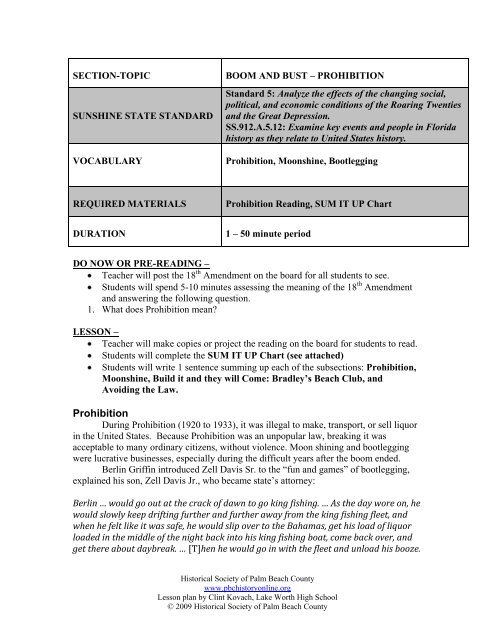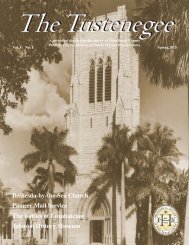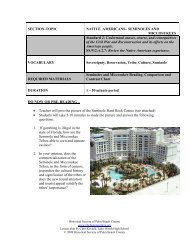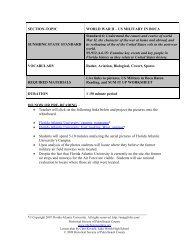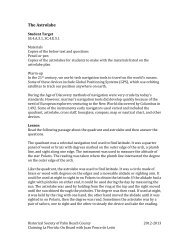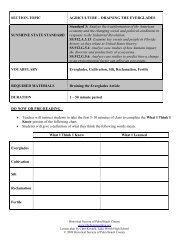High School Lesson Plan - Prohibition - Palm Beach County History ...
High School Lesson Plan - Prohibition - Palm Beach County History ...
High School Lesson Plan - Prohibition - Palm Beach County History ...
You also want an ePaper? Increase the reach of your titles
YUMPU automatically turns print PDFs into web optimized ePapers that Google loves.
SECTION-TOPIC<br />
SUNSHINE STATE STANDARD<br />
VOCABULARY<br />
BOOM AND BUST – PROHIBITION<br />
Standard 5: Analyze the effects of the changing social,<br />
political, and economic conditions of the Roaring Twenties<br />
and the Great Depression.<br />
SS.912.A.5.12: Examine key events and people in Florida<br />
history as they relate to United States history.<br />
<strong>Prohibition</strong>, Moonshine, Bootlegging<br />
REQUIRED MATERIALS<br />
<strong>Prohibition</strong> Reading, SUM IT UP Chart<br />
DURATION<br />
1 – 50 minute period<br />
DO NOW OR PRE-READING –<br />
Teacher will post the 18 th Amendment on the board for all students to see.<br />
Students will spend 5-10 minutes assessing the meaning of the 18 th Amendment<br />
and answering the following question.<br />
1. What does <strong>Prohibition</strong> mean<br />
LESSON –<br />
Teacher will make copies or project the reading on the board for students to read.<br />
Students will complete the SUM IT UP Chart (see attached)<br />
Students will write 1 sentence summing up each of the subsections: <strong>Prohibition</strong>,<br />
Moonshine, Build it and they will Come: Bradley’s <strong>Beach</strong> Club, and<br />
Avoiding the Law.<br />
<strong>Prohibition</strong><br />
During <strong>Prohibition</strong> (1920 to 1933), it was illegal to make, transport, or sell liquor<br />
in the United States. Because <strong>Prohibition</strong> was an unpopular law, breaking it was<br />
acceptable to many ordinary citizens, without violence. Moon shining and bootlegging<br />
were lucrative businesses, especially during the difficult years after the boom ended.<br />
Berlin Griffin introduced Zell Davis Sr. to the “fun and games” of bootlegging,<br />
explained his son, Zell Davis Jr., who became state’s attorney:<br />
Berlin … would go out at the crack of dawn to go king fishing. … As the day wore on, he<br />
would slowly keep drifting further and further away from the king fishing fleet, and<br />
when he felt like it was safe, he would slip over to the Bahamas, get his load of liquor<br />
loaded in the middle of the night back into his king fishing boat, come back over, and<br />
get there about daybreak. … [T]hen he would go in with the fleet and unload his booze.<br />
Historical Society of <strong>Palm</strong> <strong>Beach</strong> <strong>County</strong><br />
www.pbchistoryonline.org<br />
<strong>Lesson</strong> plan by Clint Kovach, Lake Worth <strong>High</strong> <strong>School</strong><br />
© 2009 Historical Society of <strong>Palm</strong> <strong>Beach</strong> <strong>County</strong>
Moonshine<br />
Illegal liquor, or moonshine, was produced in homemade stills, usually at<br />
night to hide the smoke they emitted. In 1928 The <strong>Palm</strong> <strong>Beach</strong> Post reported that<br />
"one of the largest stills ever," of about 1,000-gallon capacity, had been seized by<br />
<strong>Prohibition</strong> agents northeast of Kelsey City (now Lake Park) after a brief gunfight;<br />
five people were arrested. Another still of about 500 gallons had been seized near<br />
Jupiter, where residents later spoke of the woods being filled with the moonshine<br />
makers. 1<br />
Build It and They Will Come: Bradley’s <strong>Beach</strong> Club 2<br />
Beginning in 1898, the guests of the Royal Poinciana Hotel and The Breakers<br />
were within walking distance of a major new attraction: Bradley’s <strong>Beach</strong> Club, a<br />
gambling casino and restaurant. Colonel Edward Riley “E. R.” Bradley and his brother,<br />
John “Jack” Bradley, built the <strong>Beach</strong> Club just north of today’s Flagler Memorial Bridge,<br />
on land purchased from then-State Senator Elisha Dimick. E. R. Bradley was most<br />
associated with the club and eventually bought out his brother.<br />
Once Bradley decided to let women gamble, the venture prospered and became<br />
what many considered the world’s finest gambling casino. In the earlier years, roulette<br />
and hazard were the only games offered. Later chemin de fer was added, a variation of<br />
baccarat, with a $5,000 limit. Although gambling was illegal in Florida, the <strong>Beach</strong> Club<br />
circumvented that technicality by operating as a private club. Security was provided by<br />
men recruited from the Tennessee Mountains.<br />
The club was very simply decorated in green and white, with lighting that Bradley<br />
said flattered a woman’s complexion more than harsh bright lights.<br />
Drinking and smoking were not allowed in the gambling rooms, only in the dining<br />
room, where the headwaiter would oversee the consumption of alcohol. It was difficult to<br />
control, said Bohne, especially during <strong>Prohibition</strong>, when diners brought their own<br />
beverages: “They would be called to telephone [and Bradley would] meet „em and say,<br />
„Young man, you‟re drinking a little heavy tonight. Come back tomorrow and everything<br />
will be settled.‟ If the fella got unruly, he was out. But it was done in a nice manner.”<br />
At E. R. Bradley’s <strong>Beach</strong> Club in <strong>Palm</strong> <strong>Beach</strong>, Thomas Tipton “T. T.” Reese Sr.<br />
was in charge of securing liquor for the club from the Bahamas Islands, just 66 miles<br />
away, according to his son, T. T. Reese Jr.:<br />
My Dada reached Captain [Irving] Hiscock and sent him to Nassau to charter a<br />
schooner, load it with the inventory listed, take it to the west end of Grand Bahama<br />
[Island], and set it up for delivery into <strong>Palm</strong> <strong>Beach</strong>. Fishing skiffs were secured and<br />
loaded and came over in broad daylight and unloaded into A[lexander] B. Otwell’s<br />
trucks at the foot of Sunset Avenue, thence into storage at the club. … They first used<br />
chicken wire to enclose the cargo ashore; later they constructed a warehouse.<br />
1 Kevin Hemstock, “Jupiter was the Hub for Illegal Booze,” The Jupiter Courier, 2-9-2000, including<br />
citation of The <strong>Palm</strong> <strong>Beach</strong> Post, 2-3-1928.<br />
2 Oral Histories of Harry Redifer, Tom Bohne (HSPBC 1962); T. T. Reese Jr., “Notes on happenings<br />
connected with the <strong>Beach</strong> Club” (HSPBC); By-Laws of the <strong>Beach</strong> Club (1899).<br />
Historical Society of <strong>Palm</strong> <strong>Beach</strong> <strong>County</strong><br />
www.pbchistoryonline.org<br />
<strong>Lesson</strong> plan by Clint Kovach, Lake Worth <strong>High</strong> <strong>School</strong><br />
© 2009 Historical Society of <strong>Palm</strong> <strong>Beach</strong> <strong>County</strong>
Avoiding the Law<br />
Everyone seems to think, and he probably did, [E. R. Bradley] had to pay off officials, but<br />
I was with him 20 years and during that time, I could swear that I never saw him pay<br />
anyone a penny of [bribery]. Yes, he was raided several times, but they was [sic] always<br />
tipped off and he had everything hid away, and … the guests would sit down and drink<br />
tea at the tables. … And they would all join in the fun while the inspector from the<br />
governor‟s office would go around and search the place—not too methodically, but<br />
search the place. The [gambling] tables all folded up and looked like a tea table when<br />
they took the layout off of them. Harry Redifer built the [hiding] places for them.<br />
Tom Bohne, secretary to E. R. Bradley<br />
ASSESSMENT/EVALUATION -<br />
Students will answer the following questions following completion of the reading.<br />
PROHIBITION QUESTION<br />
Directions: Answer the following question concerning the quotation<br />
from the Avoiding the Law paragraph.<br />
1. According to the quotation by Tom Bohne about E.R. Bradley’s <strong>Beach</strong> Club,<br />
Bradley never paid a bribe to anyone; however he did serve alcohol during<br />
<strong>Prohibition</strong>.<br />
Assess the quotation and make a judgment based on your opinion. Should E.R.<br />
Bradley be seen as a local hero for providing alcohol during <strong>Prohibition</strong> or should<br />
he be considered a common law breaker who circumvented the system<br />
Historical Society of <strong>Palm</strong> <strong>Beach</strong> <strong>County</strong><br />
www.pbchistoryonline.org<br />
<strong>Lesson</strong> plan by Clint Kovach, Lake Worth <strong>High</strong> <strong>School</strong><br />
© 2009 Historical Society of <strong>Palm</strong> <strong>Beach</strong> <strong>County</strong>
SUM IT UP CHART<br />
Directions: For each of the sections below, write 1 sentence summarizing<br />
the following paragraphs.<br />
<strong>Prohibition</strong><br />
Moonshine<br />
Build it and<br />
they will<br />
come:<br />
Bradley’s<br />
<strong>Beach</strong> Club<br />
Avoiding<br />
the Law<br />
Historical Society of <strong>Palm</strong> <strong>Beach</strong> <strong>County</strong><br />
www.pbchistoryonline.org<br />
<strong>Lesson</strong> plan by Clint Kovach, Lake Worth <strong>High</strong> <strong>School</strong><br />
© 2009 Historical Society of <strong>Palm</strong> <strong>Beach</strong> <strong>County</strong>


